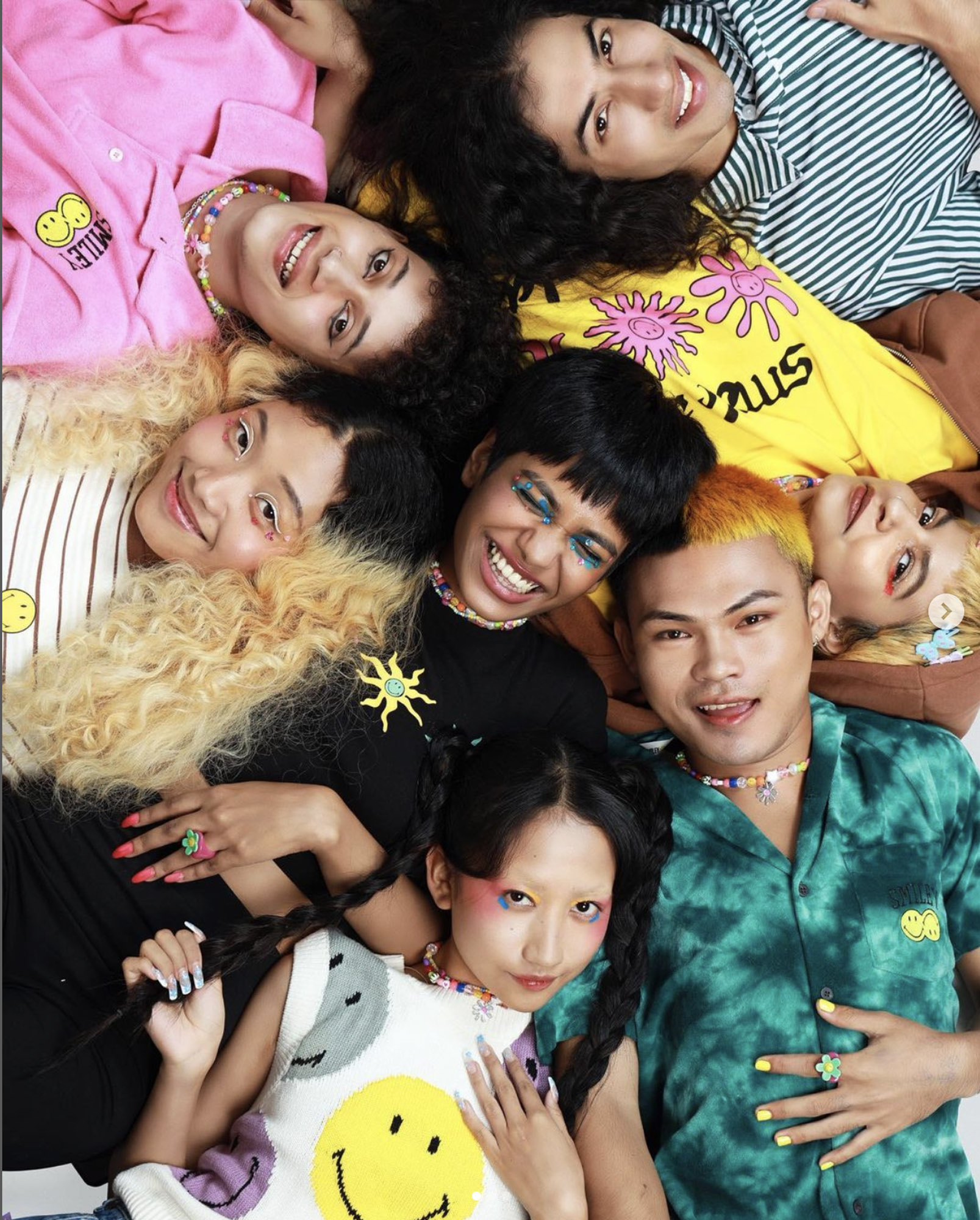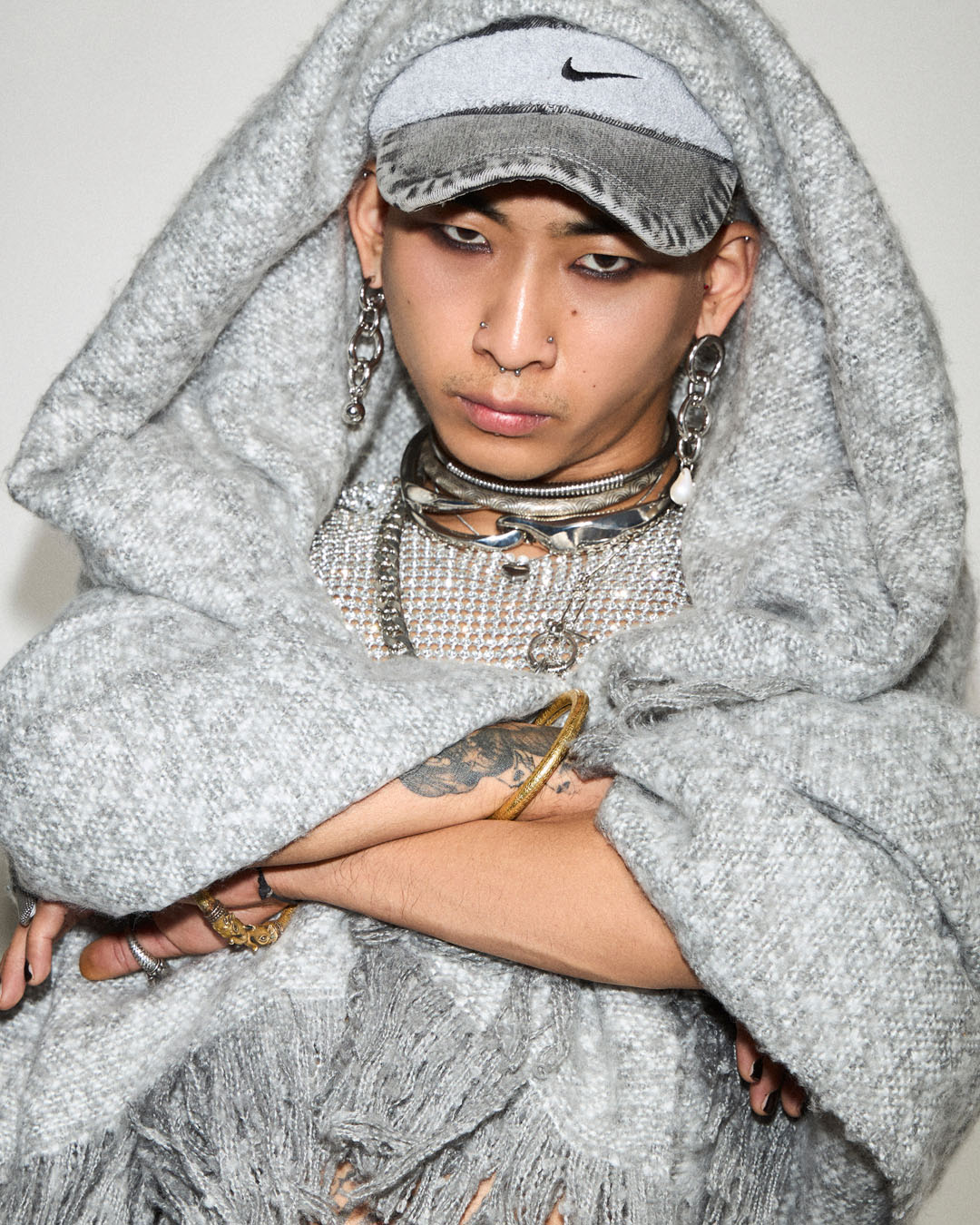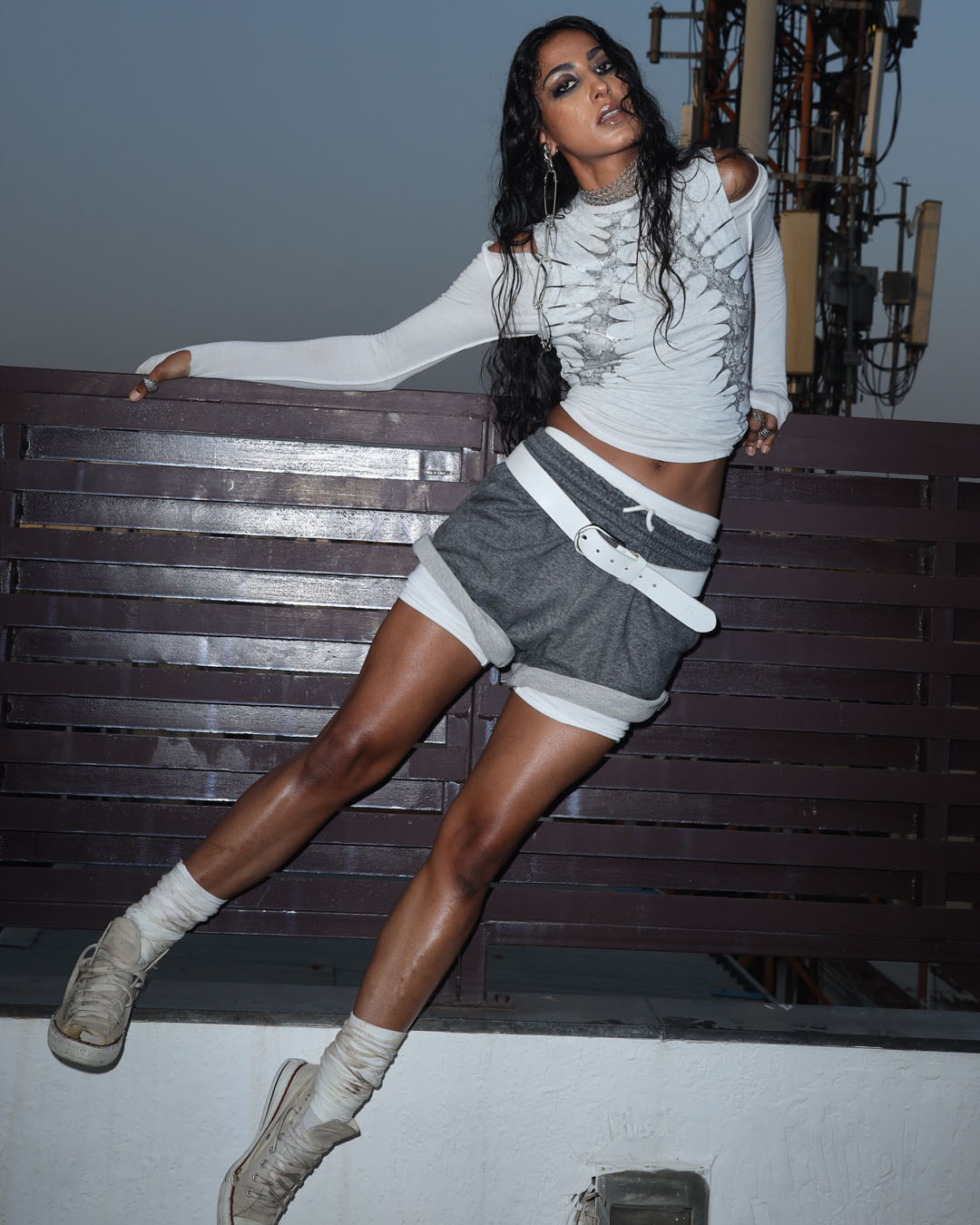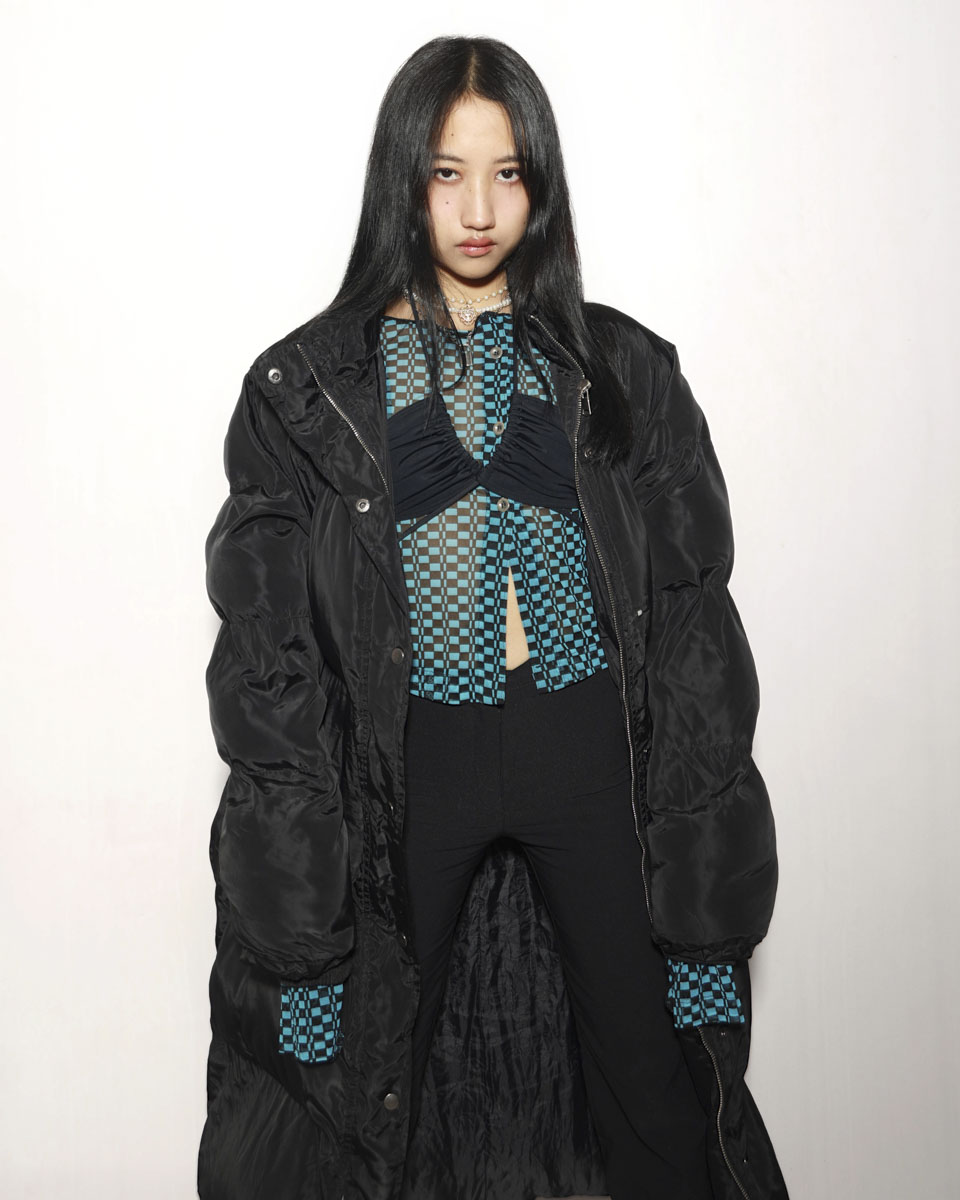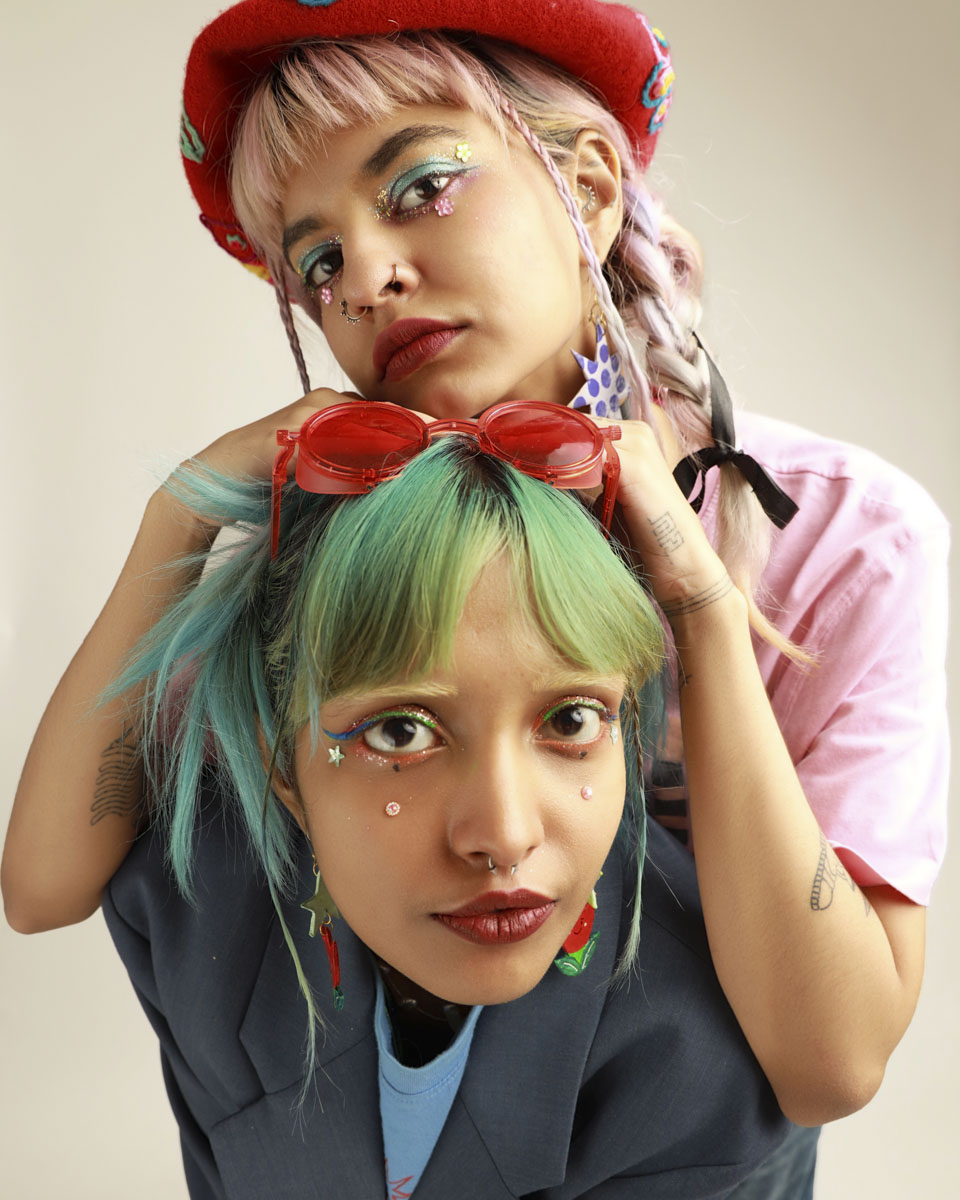Hers is a story wrapped in intrigue, adventure, awe, and most of all inspiration. Tenzin Mariko, the first Tibetan transgender woman, has been making waves in her community and outside. Maybe because she is the first Tibetan to come out openly about her sexuality and wear it with a fearless elegance or maybe it is because she used to be a monk before she was a woman
Story by: Treesha Datta
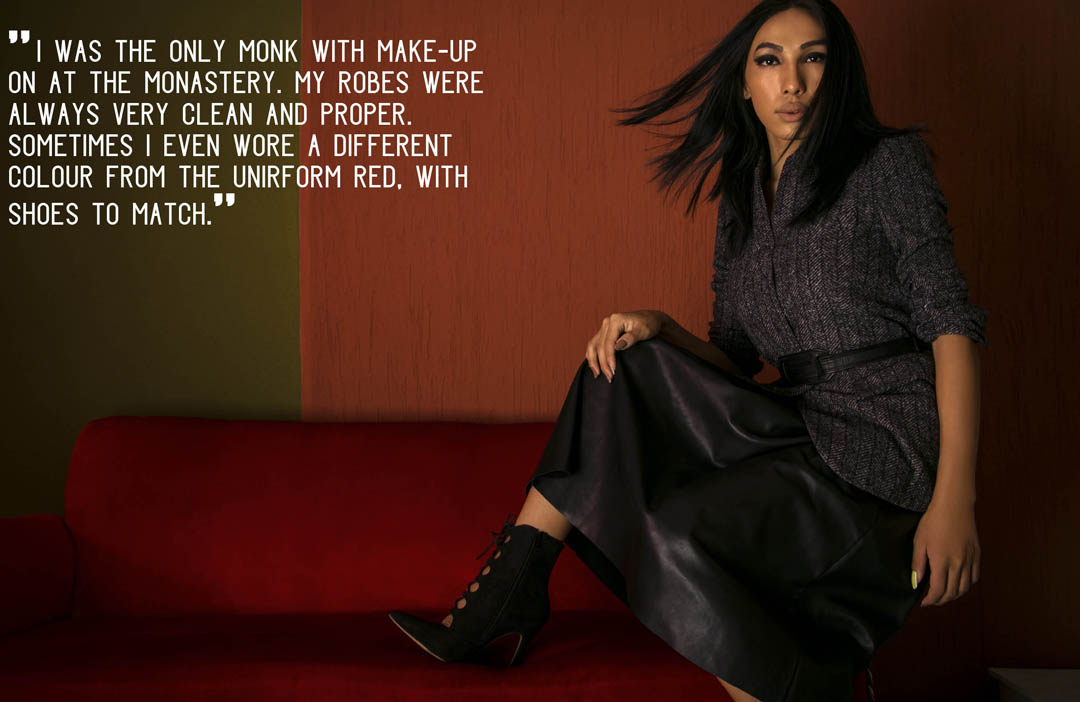
Jacket, Zara; Skirt, Shoes Forever 21
I met her at a popular coffee shop in South Delhi. Tenzin Mariko’s current base is the capital city as she is pursuing formal training here to become a make-up artist. Her other home will always be Dharamsala, where her family lives. And while she currently loves performing as a dancer she confesses, “make-up has been with her forever”. Earlier while looking for her, the staff of the coffee shop pointed her out to me as the ‘foreigner’ who was sitting by the window outside. And she did look every bit exotic. Tall, toned and elegantly dressed in a short flowy powder-blue top, off-white palazzos and gold hoops with a slick pony-tail. Her make-up subtle but the nails, a dash of deep red, added the right amount of oomph to complete the outfit. “For me fashion is all about comfort. I may be young, but my personal taste is more relatable to mature women”, Mariko tells me later. If I didn’t know already it would have been difficult to believe that she was born male, in a small town in Himachal Pradesh called Suja. She grew up there till she was 9, until her father took her along with her younger brother to Darjeeling, to join a monastery as a monk.
“It was so funny you know because earlier our friends would go to places during vacations and tell us stories about how they went there, by train, bus or car but we never did. We vacationed and lived in Suja. But when I went to Darjeeling, I had to take a bus from Himachal to Delhi and then a train from Delhi to Siliguri from there a jeep ride to Darjeeling. Covered everything in one go,” she tells me laughing back at the childhood memory. She spent 4 years there, and for the first time she was in a place where no one spoke Tibetan. “There was a time when I had almost forgotten how to speak Tibetan myself, and it is so bad you know, being a Tibetan and not speaking the language but being able to speak Nepalese?”. The siblings had to pick up the language to survive socially as most monks were Nepalese, Mariko and her brother were the only Tibetan monks of their age group in the monastery. While the siblings were getting used to this new life, which along with other things also included a shaved head and similar robes every day, life at home was in turmoil. Her parents were separating and not being able to go meet them then, were some of the toughest times.
“I met my father two years after I first reached Darjeeling.” With him came the news of the divorce. After finishing her four year course in Darjeeling, she was soon sent to Nepal to another monastery, “it was kind of for higher studies in monkhood,” she explains. Here she further studied for over a year and it is from here that she went to Bodh Gaya to attend certain yearly Buddhist ceremonial prayers. “That was my first time in Bodh Gaya and that’s where I saw my mother. I was seeing her after 7 years. I couldn’t believe my eyes. She did not recognise me at first, since I was all grown up, but I shouted out to her and she stayed shocked for a few minutes. We hugged and we cried right there in the middle of the street.” She had the chance to spend a few more days with her mother after their reunion and then had to return to Nepal, this time accompanied by her younger brother. “By this time we were a bit grown up and started to know about the world. This time when I came back, me and my brother left the monastery for 2 or 3 nights. We were curious and booked a hotel room not too far away from the monastery, and had fun. Not to mean any controversial things by fun, but the freedom that we got was a lot of fun after being in the monastery for so many years and leading a strict disciplined life.” When they got back to the monastery, the mood was sombre and they were punished by beating for disappearing. This is when they decided to run away from the monastery for good and come home.
Coming home to Dharamsala was another adventure. Mariko and her brother took a bus from Nepal to New Delhi. At the bus station she could only pay fare for one person and therefore almost begged the bus conductors to let her younger brother come with her. “It must be my good Karma or the monk’s clothes, but people were kind,” she says. They met a man on the bus, who said he was from the army and he took care of them till they reached New Delhi. He even took the siblings for a movie, gave them shelter for a night in the capital, bought them tickets to Dharamsala! She had never been to Dharamsala before either, although it was not too far from her home in Suja. But this is where her father and brothers lived. So now when they landed there, for the first time, it was a task for the two young monks in dirty robes and bags, to find their family. That’s when Mariko spotted a friend of her mother’s and asked her where her father lived. The lady showed them the way, but without detailed instructions. The two went in the direction she guided, shouting the names of her brothers out loud. Her oldest brother heard their voice from far away and thought it was a dream at first. Finally, the family was reunited.

Jacket, Zara; Dress, Forever 21
“We were a family of six brothers. Now we are five brothers and one sister.” I ask her about her coming out and she tells me that she was always feminine. Dressing up in her mother’s clothes as a child. After coming to Dharamshala she was still attending the local monastery, but now as a teenager curiosity overtook everything else. “Even back then my friends used to say I was the most stylish monk they had ever seen. My robes were always very clean, sometimes I wore a different colour, later even had shoes to match them. Around this time I got my smart phone and that was instrumental. I started looking at make-up tutorial videos and would try new things. I was also threading my eyebrows. I used to stand out during the teachings as I was the only monk in the monastery with make-up on. I was like a white crow in the flock!”
Around this time Tenzin had to travel to Delhi for a friend’s wedding. She decided to dress up like a woman because she wanted to and let her hair down. She remembers dancing at the function, but by the time she was back in Dharamshala there was a video of that dance performance circulating amongst the Tibetan community. When asked if it was her, she denied at first, but admitted that it was her to certain close friends. “A friend’s mother and even my brothers then told me the same thing. That if I stopped being a monk I could do what I wanted.” This made up her mind. When she went to the monastery the next day to attend Dalai Lama’s teachings she shocked everyone by arriving in pants instead of her robe. Even though her friends and family were largely supportive, she says at that time they didn’t know she was going to be a transgender woman. It was on 5th June 2015 that she came out to the world in the avatar that she had embraced and accepted, that of a woman, at the Miss Tibet contest. “That was the first time I performed and came out to the world as a transgender woman.”
She danced on quite a few popular Bollywood numbers and with the crowd going wild, as can be witnessed in the clip uploaded on YouTube, her popularity soared overnight. “I used to be a monk who had disrobed first and was now dancing like a girl. I thought people might throw tomatoes at me. But nobody did. In fact everyone cheered, even saying that I performed better than the contest winner that year. Quite a few people started thinking that I am Miss Tibet because of that performance when I was not even a contestant!”
That day changed her forever. A tough childhood followed by those years of hiding behind the robe was finally over. Today Tenzin gets invited to perform all over the country and people have been gracious and accepting of her. She feels independent now and wants to be a make-up artist, a second career goal. And someday when she has collected enough money she would love to get a complete sex change operation done. Have there been haters? “Of course there are people who will say things. But I believe that everyone should follow their heart and do what makes them truly happy. I am someone who is very broadminded. Even if I hear people saying ‘Is that a boy or a girl?’ from a distance, I wouldn’t react. Because I was a boy, that is true, and now I am a girl. That is true too. If they came and asked me I would say, ‘It is none of your business’. Some people have even called me chakka. It used to hurt earlier, not anymore. We have grown used to it.” She describes an incident when a stranger called her names and her mother defended her, but later broke down. “It is we who can control our lives, so it is up to me whether I choose to hear all this and take it to heart or forget about something someone said who I may not see ever again. But people have been so gracious in the past year. I have been clicking pictures and giving autographs all year last year. And it makes me feel really good that people want a part of me,” her face lighting up as she tells me . We have finished our coffees by now and I accompany her to pick up a dress for her next public appearance for a Halloween bash in Bengaluru. It did not feel like I met Mariko for the first time. She has an innate warmth that can draw people in, and her positivity rubs off. We finally bid our goodbyes, promising to keep in touch and off she went, to bedazzle another city and win a few more hearts.

Hair and make-up: Anuj Dogra

